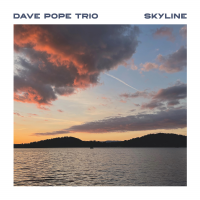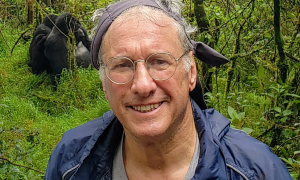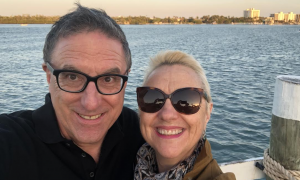Home » Jazz Articles » Out and About: The Super Fans » Meet Mark Weber
Meet Mark Weber
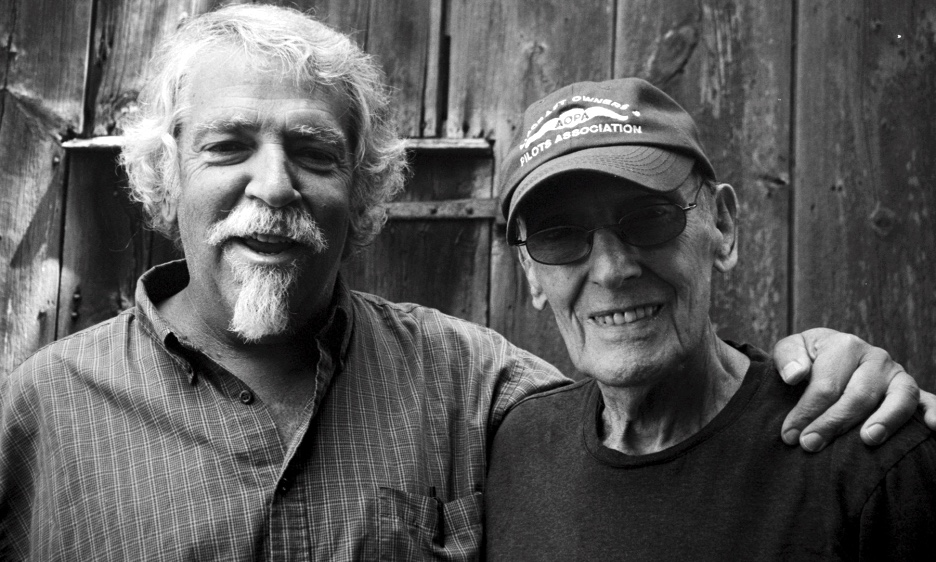
Maybe I'm like those early 20th-century country folk who would walk ten miles just to see some guy in a suit (Coleman Hawkins, let's say) play a shiny saxophone? There's a nobility to this music, and you just want to be wherever it is manifesting.
—Mark Weber
Tell us a bit about yourself.
I was born and raised in the Los Angeles metropolitan area and spent my first 32 years there—1953-1986. I'm at that age where friends are retiring and I'm still wondering what my job is supposed to be that I can "retire" from. I'm a career bohemian, I guess. Although, unlike my hero, Maynard G Krebs, I wasn't shy of work. I always say I've worked on land, sea, and air. As a kid I mowed lawns. I've built houses, worked shipping and receiving, worked on oil derricks in the Gulf of Mexico, been a wedding photographer and auto mechanic, and worked at the post office, and all the while I was a writer. When my hometown newspaper, The Daily Report, turned me down, I realized that was providential, as I would hate to turn something I love so much into drudgery. Sort of how I wound up writing the L.A. column for CODA for 18 years. I had no desire to be a jazz writer, but hanging out on the scene, I drew the short straw and was sent to infiltrate the magazine, mostly wanting to make myself useful—I was 22 at the time and even though I had swallowed jazz whole, I still had a lot to learn. But house painting is what I did here in Albuquerque. My wife, Janet, and I moved here in 1991, and I did that for 15 years or so, and loved it. It's relaxing. I painted a lot of houses. Walking along with

Leroy Jenkins
bass, electric1932 - 2007
What's your earliest memory of music?
This is sort of Freudian isn't it? My friend, the violinist Eileen Sullivan, told me that when she was pregnant she used to listen to this Mozart horn concerto she was studying, and after her son was born, one day she happened to be listening to the recording of that same horn concerto and her son, who had been playing with friends in the yard came inside and went to Eileen and hugged her and laid down in her lap.
How old were you when you got your first record?
Must have been early seventh grade. It was Paul Revere and the Raiders. I wish I could say Coltrane or Bartok, but that was a few years down the line. I grew up in the Top 40 AM transistor radio era. Much earlier in my life we had a 78 player in an antique console, but by the mid-60s there was no record player in our house, so with paper route earnings I bought a little $17 box 3-speed turntable. I actually had my first album (Mr. Revere) before I had a record player! Maybe I just liked looking at them dressed in revolutionary war uniforms on the cover?
But I was mostly a radio listener. AM radio for a few years: I'd sit on the edge of my bed and set the transistor radio next to me tuned to KHJ or KRLA and rock back and forth for hours. (I'm what psychologists call a rocker; we'd have to flip the mattress, as there was a depression where I wore out the springs. Nowadays, every once in a great while I'll spot a kid rocking in the back seat of his parents' car and wonder what in the Sam Hill is wrong with that weirdo.) By seventh grade my parents had bought one of those "contempo moderne" pieces of furniture that had a stereo in it, and late at night I'd listen to FM radio quietly—like listening to Radio Free America, right? It was a pure stroke of luck that I was within earshot of one of the early "underground radio" stations: KPPC out of Pasadena, California, where I was completely brought up to speed on the boho scene: The psychedelic '60s in full swing, this station focused mostly on folkies, blues, rock, and a smattering of jazz. I heard Bird for the first time on this station, and Lord Buckley,
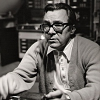
Ken Nordine
poet / spoken word1920 - 2019
What was the first concert you ever attended?
This is sort of fuzzy, but I think it was Judy Collins, and I took my girlfriend Laurie Ryan (her mother drove us). That would be 1968? The concert was magical. When you are so young you can hardly believe that you can go see these mythical beings, and she stood there radiant, with only a guitar and her sylvan voice, it was like Galadriel singing. But, also, those years I was hitchhiking to the nearby Claremont College where I'd see Rambling Jack Elliott, John Fahey, Elizabeth Cotten, Guy Carawan, all those acts that were on the circuit coming out of Club 47 in Cambridge. Their fingerpicking blew my mind. I grew up playing guitar with my grandfather, who was country, so I had never seen anything like this kind of finger facility before, and the audiences those years were so reverent, you really felt the sense of the '60s and how things were opening up.
Was there one album or experience that was your doorway to jazz?
Just to name one, in my early years I had experiences of transport with

John Coltrane
saxophone1926 - 1967

Eric Dolphy
woodwinds1928 - 1964

Ornette Coleman
saxophone, alto1930 - 2015
How often do you go out to hear live music?
These days, at least once a week. We have Thursday Night Jazz at our local club, The Outpost Performance Space; this Thursday is the

Billy Hart
drumsb.1940
What is it about live music that makes it so special for you?
Jazz is a living music. And, as they say, "jazz" is not a type of music, but an approach. Records are an artifact, and we love our records, but live music is the real deal. There is almost no comparison. Maybe I'm like those early 20th-century country folk who would walk ten miles just to see some guy in a suit (

Coleman Hawkins
saxophone, tenor1904 - 1969
What are the elements of an amazing performance?
Honest intensity. Communion. Playing that is so out there in its reach that you are on the edge of your seat, like

Connie Crothers
piano1941 - 2016
What is the most trouble you've gone to to get to a jazz performance?
In October 1974 my friend George and I drove a beat-up, broken-down VW Bug 500+ miles from Southern California to Keystone Korner in San Francisco to see

Sun Ra
piano1914 - 1993
Is there one concert that got away that you still regret having missed?
This is a great question, and I have an absolute answer:

Duke Ellington
piano1899 - 1974
If you could go back in time and hear one of the jazz legends perform live, who would it be?

Bix Beiderbecke
cornet1903 - 1931

Albert Ayler
saxophone, tenor1936 - 1970

Buddy Bolden
cornet1877 - 1931
What makes a great jazz club?
There are three types of venues: presentation spaces, festivals, and clubs (taverns, bars, restaurants, dives), and all have their peculiarities. As my inner anthropologist continues to emerge I've found that clubs are where the music is the most pure: Noisy dinner clubs with a band in the corner carrying on, playing the American songbook standards. An anthropologist looks askance at something like a blues festival: the blues needs be experienced in its context, in some blue collar bar with beer served in paper cups. Same with jazz. A presentation space is where an artist brings a refined edition of what they are up to, which is a great thing. A club is more experimental and loose-limbed and devil-may-care. Somebody's mother might be pushed on stage to sing a song. The guy who fixed your car last week sits in on saxophone. The music students take a chance and play a few songs with seasoned pros. That's jazz and long may it live.
Which club(s) are you most regularly to be found at?
Outpost Performance Space, Albuquerque. The dives along Central Avenue (Route 66) in town, and some up in Santa Fe, like last week on Canyon Road in an 1835 adobe hacienda converted to a restaurant, El Farol, we caught the fabulous " data-original-title="" title="">Pat Malone Trio with Pat (guitar),
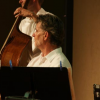
Cal Haines
drumsIs there a club that's no longer around that you miss the most?
Donte's, North Hollywood. I got my PhD in jazz there. That was the '70s and '80s. All the great studio musicians played Donte's. All the cats that came out of the

Woody Herman
band / ensemble / orchestra1913 - 1987

Stan Kenton
piano1911 - 1979
Do you have a favorite jazz anecdote?
Hundreds. But here's one: the clarinetist

Kenny Davern
clarinet1935 - 2006

Evan Parker
saxophone, sopranob.1944

Albert Ayler
saxophone, tenor1936 - 1970
But mostly, he wasn't into it. So, one evening we're on the telephone and I have to break off and I say, "Kenny, I got to get off, there's this killer band from Amsterdam playing the Outpost tonight and if you have any brains you'll check it out," not in the least figuring he'll come. But to my horror, halfway through the first set, in comes Kenny. I thought: Oh gawd, he's going to kill me. Instant Composers Pool was up to its usual musical hijinks and I figured I was dead (Kenny was a dear and loving guy but he could be tough as nails).
At the break he comes up to me (I was avoiding him) with a big smile and enthuses, "These guys are great!" Completely buffaloed me. Left turn. So, I take him backstage and introduce him to this eleven-piece band and they are jumping all around, excited that Kenny's there, and Kenny points to

Han Bennink
drumsb.1942
Cliff Leeman
b.1913
Eddie Condon
guitar1905 - 1973

Hoagy Carmichael
piano1899 - 1981
How do you discover new artists?
Word of mouth, mostly. Of course, the radio station receives lots of new CDs, and the music is coming fast and furious, a lot of great young people wading into it.
Vinyl, CDs, MP3s, streaming?
Any and all. Whatever works, although, I'm a technoklutz and never too sure how to negotiate a lot of the new media. I usually turn over the complicated things to my engineers, and they turn them into CDs.
What's your desert island disc?
I'm partial to Herbie Nichols' track "Sunday Stroll." I could listen to that over and over and, in fact, sometimes on the radio show I do play it twice in a row. Also,

Sheila Jordan
vocals1928 - 2025

Horace Tapscott
piano1934 - 1999
Lenny Popkin
b.1941
Lester Young
saxophone1909 - 1959
If you were a professional musician, which instrument would you play and why?
My absolute relationship with music is as a listener. I had
Sonny Dallas
bassb.1931

Lennie Tristano
piano1919 - 1978
But you do perform your poetry. Tell us about that.
W.H. Auden posed the conundrum many years ago: What does a poet do with the remainder of the day after he's written his one poem of the day? Well, I listen to music. And read and so forth. Endeavor to keep healthy, all that. My involvement with poetry and jazz is all about health. It's a way to be social; writing is such a solitary activity, you can get stuck in your cave if you're not careful. And what more social could you get than by putting your head together with someone and creating something? And then in performance see if you can make this thing come across.
In conversations with the piano alchemist
Virg Dzurinko
pianoI had not one iota of desire to be on stage (and still feel that way), but somehow the gods conspired otherwise. You had to get your stagecraft together if you wanted to get your poetry out there. So I asked jazz musicians to back me up, and I had plenty of friends who were jazzers, so it worked out. The thing is, the musicians are having all the fun, improvising in the moment, while I'm reading something that had its moment of magic spark back at the typewriter. My first successful collaborations were with Los Angeles trombonist

Michael Vlatkovich
tromboneb.1951

Andrea Wolper
vocals
Kazzrie Jaxen
piano and vocals
Carol Liebowitz
pianob.1953
You've taken a lot of pictures through the years.
Photography was a natural outgrowth of my graphic work. And when my high school started a photography lab in 1970 I was there, with bells on. It was photography that provided the means for me to graduate. I wasn't particularly fond of high school, only about twenty percent of those in charge of our education were real teachers. The idea seemed to be to prepare us to join the military industrial complex. So, after one of my attempts to disenfranchise myself from their endeavors (aka quitting school), they worked out a deal where in my last year I was photo lab assistant, and that's how I got my diploma.
It never occurred to me to take photos of concerts. I was mostly following in the footsteps of photographers like Man Ray, Edward Steichen, Edward Weston, Alfred Stieglitz, then later, Henri Cartier-Bresson, Mary Ellen Mark, Robert Frank—my photography teacher briefly studied with W. Eugene Smith (if anybody can be said to have studied with Smith). It was when clarinetist

John Carter
clarinetb.1929

Art Ensemble Of Chicago
band / ensemble / orchestraTell us about your radio show.
What could be more fun than spinning your favorite records on the airwaves? Old-school terrestrial radio will never go away and KUNM is marvelous in supporting my endeavors of spreading my version of what jazz is. I've probably interviewed close to 300 jazz folk on my Thursday noon jazz show (streaming on the web, also), which is all archived at IJS Institute of Jazz Studies, Newark, and at UCLA. I'm still studying the craft of interviewing and have my little bag of tricks having done my first interview with a jazzer for CODA when I was twenty-three. As far as I'm concerned it's one of the best uses of the public airwaves. I'm an advocate for the artists, whereby we let them explain themselves and their work. On radio you need an interviewee who is articulate and somewhat loquacious, and jazz musicians are not always that, but I discovered that 80-year-olds love to talk! Amazing. Seems so obvious, but it had never occurred to me. So, a few years back I did 40 on successive Thursdays with old boppers, a tour de force. Something I doubt I'll be repeating—that was a lot of work.
What do you think keeps jazz alive and thriving?
Dreams, mythology...
Well, that's the question of the century, isn't it? I'm not sure I'd characterize it as "thriving," but that's okay, jazz isn't for everybody. There's something inherent in the layered rhythms and the wide-open harmony and the nature of in-the-moment improvisation that appeals to the human spirit. So, it's not going away. It does seem like it's digging a bit further underground lately. The Trump Effect. This guy is so embarrassing that we don't want to go out anymore. It's had a draining effect on us. I suppose we'll get over it. And there will be jazz waiting for us! "Hey, where you been? We missed you. Yeah, I'm still bouncing off the moon."
Is there anything else we should know about you?
I wish I had had the nerve to move to NYC in my early days. I was fortunate to have grown up in such a great jazz city as L.A., but part of me dreamed of NYC. I didn't visit NYC until 1986—my Janet was in med school in Cleveland, which was striking distance, and her sister is a professor at Columbia, and being impecunious, it was favorable for my maiden voyage (Janet is a New Yorker so it was old hat to her). We drove through the Allegheny Mountains in the fall and it was magical, crossing the George Washington Bridge was euphoria, at a stop light some rough-looking guy washed our windows and demanded money, we didn't have any spare money so we took the green light. The adventure was in full swing. I saw a listing where Aaron Copland was playing solo piano at a dinner club and so I called and found out it was a little more upscale than we could afford, but I could hear a piano and asked if that was Aaron Copland, and would she hold the phone so I could hear a minute of him? I was in New York, finally. I've visited every year since.
Finish this sentence: Life without music would be...
...the Victrola hound dog out of a job.
Tags
Out and About: The Super Fans
Tessa Souter and Andrea Wolper
Leroy Jenkins
Eileen Sullivan
John Coltrane
Eric Dolphy
Ornette Colman
Billy Hart
Coleman Hawkins
Connie Crothers
Sun Ra
duke ellington
Bix Beiderbecke
Albert Ayler
Buddy Bolden
Albuquerque
Pat Malone
Cal Haines
Colin Deuble
Woody Herman
Stan Kenton
Kenny Davern
evan parker
Instant Composers Pool
Han Bennink
Cliff Leeman
Eddie Condon
Hoagy Carmichael
Sonny Dallas
Lennie Tristano
Virg Dzurinko
Michael Vlatkovich
Sheila Jordan
Horace Tapscott
Lenny Popkin
Carol Tristano
Lester Young
John Carter
Art Ensemble of Chicago
Comments
PREVIOUS / NEXT
Support All About Jazz
 All About Jazz has been a pillar of jazz since 1995, championing it as an art form and, more importantly, supporting the musicians who make it. Our enduring commitment has made "AAJ" one of the most culturally important websites of its kind, read by hundreds of thousands of fans, musicians and industry figures every month.
All About Jazz has been a pillar of jazz since 1995, championing it as an art form and, more importantly, supporting the musicians who make it. Our enduring commitment has made "AAJ" one of the most culturally important websites of its kind, read by hundreds of thousands of fans, musicians and industry figures every month.





 Buy Now
Buy Now



